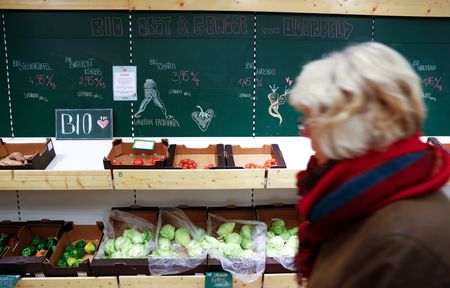By Maria Martinez
BERLIN (Reuters) -German inflation rose slightly in April due to higher food prices and a smaller drop in energy prices than in previous months, preliminary data from the federal statistics office showed on Monday.
German consumer prices, harmonised to compare with other European Union countries, rose 2.4% in April, compared with 2.3% year-on-year in March.
“The downward trend in the German inflation rate that has been observed for a year and a half may have come to an end for the time being,” Commerzbank economist Ralph Solveen said, adding that the inflation rate is likely to rise again in coming months.
The German data was released ahead of the publication of pan-euro zone figures due on Tuesday, with inflation in the bloc expected to have remained at 2.4% in April, according to economists polled by Reuters.
“The final stretch to the price target will be difficult,” said Alexander Krueger, chief economist at Hauck Aufhaeuser Lampe Privatbank. “The uneasy feeling of unpleasant inflation surprises remains.”
Still, the European Central Bank has clearly signalled it will start lowering borrowing costs in June.
In Germany, slightly more companies than in the previous month are intending to increase their prices, according to a survey by the Ifo institute published on Monday.
“Inflation is unlikely to fall any further in the coming months and is set to remain at just over 2%,” the institute’s Sascha Moehrle said.
While there was a small increase in headline inflation, core inflation, which excludes volatile food and energy prices, eased to 3.0% in April from 3.3% in March.
Commerzbank expects the core inflation rate to stabilise around current levels, as companies in the service sector in particular pass on large rises in wage costs to their customers.
Energy costs were 1.2% lower in April than a year earlier despite the discontinuation of a brake on prices in January, the introduction of a higher carbon price and the end of a temporary VAT reduction from 19% to 7% for gas and district heating, the statistics office said.
Energy prices fell 2.7% year-on-year in March.
However, food prices were 0.5% higher in April than in the same month of 2023.
Services prices are increasingly being driven by a sharp jump in wage costs, although inflation in the sector eased to an annual 3.4% in April from 3.7% in March.
“It is pleasing to note that the upward price trend in the services sector has weakened,” said Thomas Gitzel, chief economist at VP Bank. “The European Central Bank should also be pleased about this.”
(Reporting by Rachel More and Maria Martinez, Editing by Friederike Heine and Miranda Murray, Kirsten Donovan)





